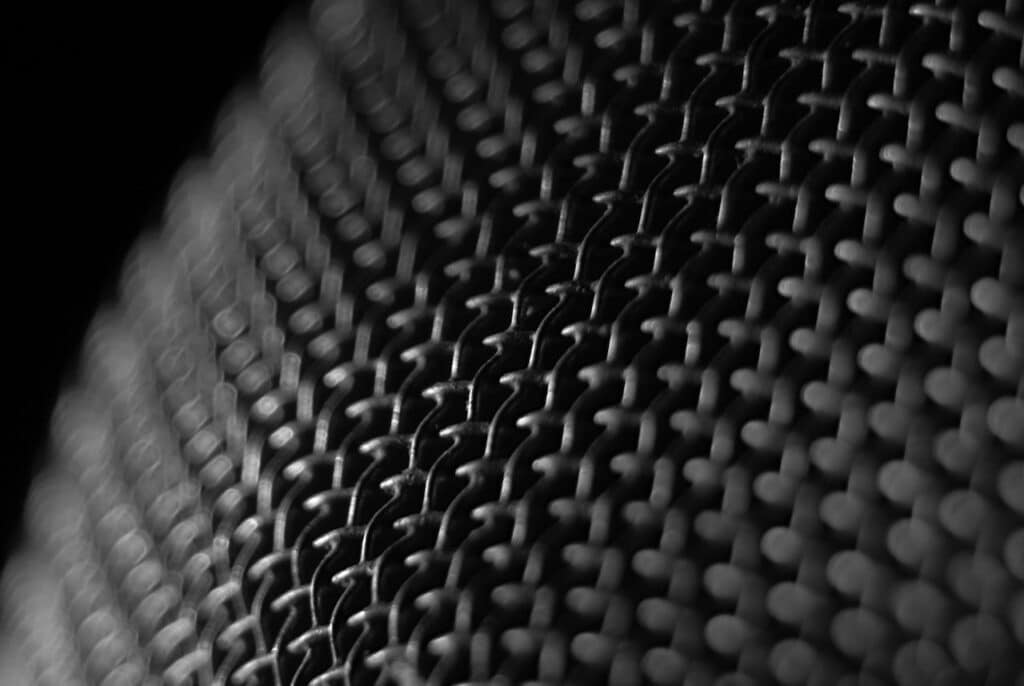A hernia mesh is a medical device used during hernia repair surgery to provide extra support to weakened or damaged tissue. The mesh, which is typically made of synthetic materials, or sometimes animal tissue, is implanted at the site of the hernia to reinforce the area and prevent the hernia from recurring.
Top Hernia Mesh Companies
| Manufacturer | Product |
| Covidien | Parietex, Symbotex, Versatex, Progrip |
| LifeCell | Strattice |
| B. Braun | Sefil |
| Ethicon | Physiomesh, Proceed, Vypro, Proline, Ultrapure |
| Atrium | C-QUR Mesh, C-QUR TacShield, C-QUR Edge Mesh, C-QUR V-Patch Mesh |
| Gore Medical | Gore-Tex, Dualmesh, Bio-A |
| Autosuture | Surgipro |
| Genzyme | Sepramesh |
| C.R. Bard | Perfix Plug, 3DMax, Ventralex, Phasix, CollaMend, OnFlex |
| Cook Medical | Surgisis |
Hernia mesh is a commonly used tool in hernia repair surgeries. The use of mesh often leads to shorter hospital stays and lower rates of hernia recurrence. However, complications from certain hernia mesh products have led to concerns about their safety and effectiveness, resulting in recalls and lawsuits against manufacturers.
Hernia Mesh Recalls
In recent years, the medical device industry has faced significant scrutiny due to a series of issues related to hernia mesh products. A wave of hernia mesh lawsuits has arisen, focusing primarily on the alleged complications caused by these medical devices.
These lawsuits allege that hernia mesh manufacturers, including Ethicon, Atrium Medical Corporation, and Covidien (Medtronic), among others, sold defective products to patients.
| Covidien (Medtronic) Recall | |
| Products | Parietex Composite Parastomal Mesh |
| Date of Recall | October 2018 |
| Atrium Medical Recall | |
| Products | C-QUR TacShield, C-QUR V-Patch Mesh, C-QUR Edge Mesh, C-QUR Mesh |
| Date of Recall | July 2013 |
| Ethicon Recall | |
| Products | Proceed |
| Date of Recall | February 2014 |
Hernia mesh is a type of surgical mesh used during hernia repair surgery. Recent allegations suggest that some hernia mesh devices have led to complications such as bowel obstruction, hernia recurrence, and in some cases, the need for additional surgery or revision surgery.

Pros & Cons of Hernia Mesh Repairs
Pros
- Lower Recurrence Rates – Mesh repairs have been shown to significantly reduce the risk of hernia recurrence compared to non-mesh repairs.
- Increased Tensile Strength – Mesh adds strength to the repair and provides additional support to the weakened area.
- Versatility – There are different types of hernia mesh, including absorbable, non-absorbable, synthetic, and biologic, allowing physicians to choose the most appropriate type for the specific patient and hernia type.
- Improved Recovery Times – With some types of hernia, mesh repair surgeries can often lead to shorter recovery times and a quicker return to normal activities.
Cons
- Risk of Complications – Potential complications of mesh repair include infection, pain, and mesh migration or shrinkage.
- Foreign Body Reaction – The body may recognize the mesh as a foreign object and try to refuse it. This can lead to chronic inflammation or rejection of the mesh.
- Risk of Mesh-Related Complications – In rare cases, the mesh can erode into the intestines or other organs, leading to serious complications.
- Difficulty in Future Surgeries – If additional surgeries are needed in the future, the presence of mesh can make surgery more challenging.
What Are the Different Types of Hernia Mesh?
Hernia meshes come in a variety of forms, each designed with specific materials and functions tailored to different needs. The diverse classifications of hernia meshes are based on their material composition and how they interact within the body.
Composite Mesh
Composite meshes are typically synthetic meshes enveloped by a layer of absorbable or non-absorbable coating, such as collagen or cellulose. The coating is designed to mitigate the body’s inflammatory response when the mesh comes in contact with body tissues.
Synthetic Mesh
Synthetic mesh is one of the most common types of hernia mesh. It’s made from a form of plastic called polypropylene and remains in the body indefinitely. The long-term presence of this type of mesh provides ongoing reinforcement to the weakened area.
Biologic Mesh
A biologic mesh is derived from animal or human tissue. It’s commonly manufactured from the sanitized intestine or skin of a cow (or pig). A unique feature of biologic mesh is that it is absorbable, gradually breaking down over time and being absorbed into the body. This characteristic allows the body’s own tissue to strengthen and eventually take over the role of the mesh, reducing the chances of foreign body reactions.
Combined Mesh
Some types of hernia mesh are made of two distinct materials. For instance, a mesh could be a combination of polypropylene and a biologic material, or polyester and PTFE. The purpose behind combining materials is to harness the benefits of both.

Hernia Mesh Complications
Mesh complications have ranged from mild to severe, resulting in substantial personal injury for some hernia mesh victims. In some extreme cases, a hernia mesh recall is required, resulting in considerable challenges for patients and healthcare providers.
Patients implanted with a defective mesh often experience symptoms such as pain, infection, or hernia recurrence, necessitating additional surgery. In certain situations, the mesh implant has failed entirely. In response to these allegations, many victims have filed a hernia mesh lawsuit, seeking compensation for their injuries and related costs.
Hernia mesh complications can present in a variety of ways:
Infection
Infections can occur shortly after the mesh has been implanted or may develop over a longer period. Symptoms may include fever, redness at the surgical site, and tenderness. These infections can be challenging to treat and may necessitate the removal of the hernia mesh.
Mesh Rejection
A form of foreign body reaction, mesh rejection is specifically related to synthetic meshes. Symptoms can include persistent pain, inflammation, and fatigue. In some cases, the body may encapsulate the mesh scar tissue, leading to stiffness and discomfort.
Signs of Mesh Rejection include:
- Chronic pain at the site of the mesh implant
- Fever or unexplained flu-like symptoms
- Redness, swelling, or warmth at the incision site
- Tenderness or pain when touching the surgery area
- Persistent inflammation
- Nausea or vomiting
- Bowel obstruction
- Difficulty urinating
- Recurrence of the hernia or noticeable bulge
- Appearance of a lump or mass near the surgical site
- Increase in hernia size
- Abdominal or groin pain
- Bloating or an inability to pass gas
- Unusual stiffness in the abdomen
- Wound drainage
- Sudden allergies or sensitivity reactions
- Unexplained weight loss
If you experience any of these symptoms, contact your physician immediately.
Chronic Pain
Chronic pain is one of the most common complications associated with hernia mesh. Nerves can get trapped in the mesh or the scar tissue that forms around it. The level of pain can range from mild to severe.
Mesh Migration and Shrinkage
Mesh migration is when the mesh moves from its original placement, possibly leading to organ perforation or obstruction. If the mesh contracts or shrinks, it can lead to increased tension on tissue, resulting in discomfort and a potential recurrence of the hernia.
Adhesion Formation
The implanted mesh can cause tissues in the vicinity to stick together, a condition known as adhesion. This can lead to chronic pain and potentially severe complications like bowel obstruction.
Hernia Recurrence
Although hernia recurrence is less common with mesh repairs compared to non-mesh repairs, there’s still a risk that the hernia may return in the same or adjacent area.
Patients should understand potential complications and discuss any concerns with a doctor. The physician will help determine the best course of action for hernia repair.
When To Contact a Personal Injury Lawyer
If you believe you may have suffered an injury due to a hernia mesh implant, it’s important to consult with a personal injury lawyer who specializes in defective medical device cases.
This is especially true if your hernia mesh was made by one of the companies under legal scrutiny or if you’ve been a victim of a hernia mesh recall. An attorney can protect your rights and make sure you’re compensated for any physical and emotional trauma you’ve endured.
Hernia repair surgery typically improves lives, but when complications arise due to defective hernia mesh products, it can lead to unnecessary suffering. Continued vigilance is required to ensure that these medical devices bring more benefits than harm to patients in need.
References
- https://www.abc.net.au/news/2018-12-02/hernia-mesh-concerns-grow-among-men-surgery-complications/10570182
- https://www.accessdata.fda.gov/scripts/cdrh/cfdocs/cfRES/res.cfm?id=168668
- https://www.bbc.com/news/health-45604199
- https://www.bmj.com/content/362/bmj.k4104.full
- https://www.bmj.com/content/362/bmj.k4104.full
- https://www.fda.gov/medical-devices/hernia-surgical-mesh-implants/hernia-surgical-mesh-implants-information-patients
- https://www.fda.gov/medical-devices/implants-and-prosthetics/hernia-surgical-mesh-implants
- https://www.fda.gov/medical-devices/implants-and-prosthetics/hernia-surgical-mesh-implants
- https://www.jpml.uscourts.gov/sites/jpml/files/Pending_MDL_Dockets_By_District-January-15-2019.pdf
- https://www.ncbi.nlm.nih.gov/pmc/articles/PMC4688277/
- https://www.ncbi.nlm.nih.gov/pmc/articles/PMC5571666/
- https://www.ncbi.nlm.nih.gov/pmc/articles/PMC5618132/
- https://www.ncbi.nlm.nih.gov/pmc/articles/PMC6048651/
- https://www.ncbi.nlm.nih.gov/pubmed/10172505
- https://www.ncbi.nlm.nih.gov/pubmed/22578730
- https://pubmed.ncbi.nlm.nih.gov/33746110/
- https://www.sciencedaily.com/releases/2016/10/161018094928.htm
- https://www.sciencedirect.com/science/article/pii/S1743919112000921
- https://uptodate.com/contents/reconstructive-materials-used-in-surgery-classification-and-host-response
